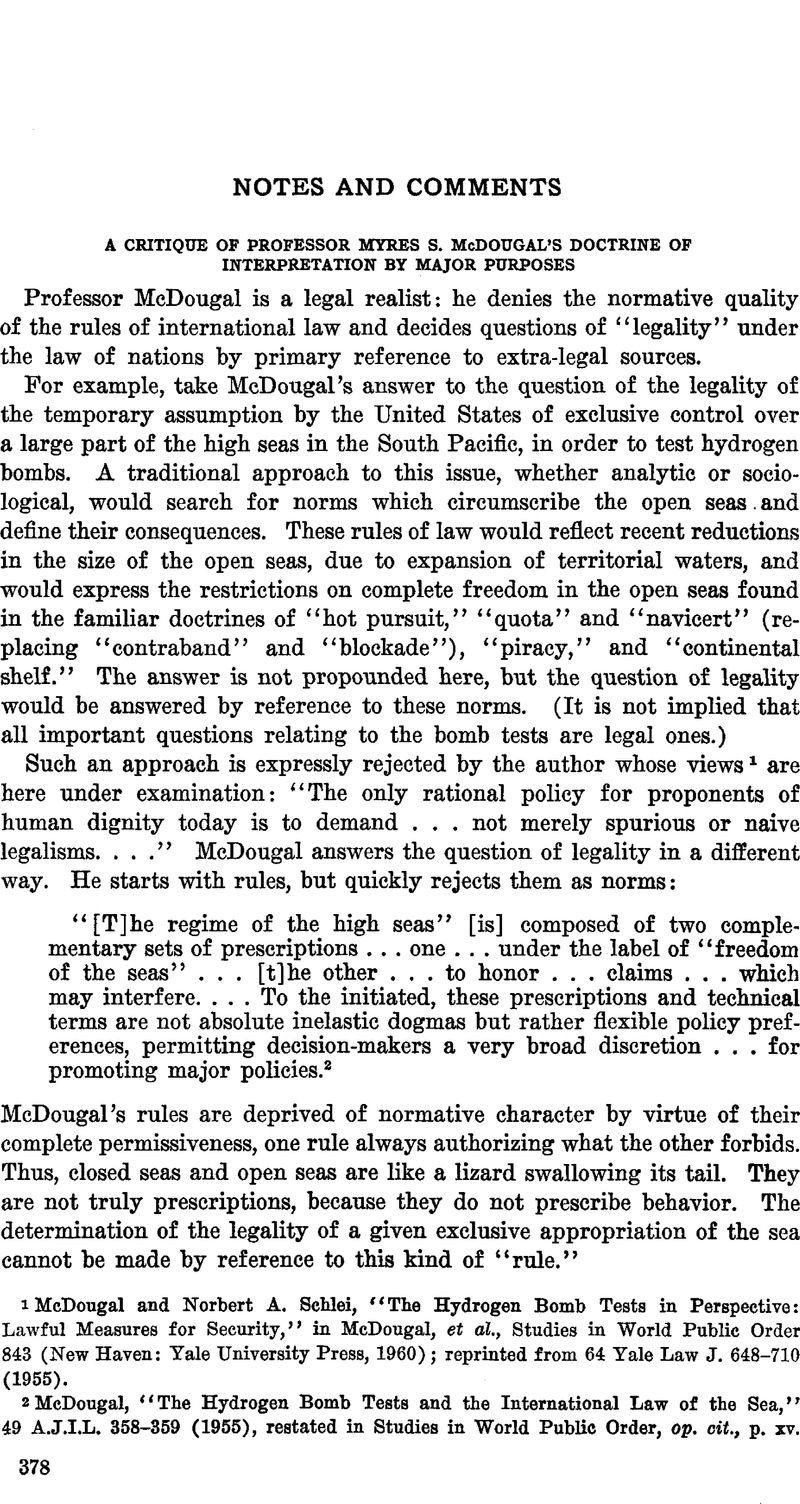Article contents
A Critique of Professor Myres S. Mcdougal’S Doctrine of Interpretation by Major Purposes
Published online by Cambridge University Press: 28 March 2017
Abstract

Information
- Type
- Notes and Comments
- Information
- Copyright
- Copyright © American Society of International Law 1963
References
1 McDougal and Norbert Sehlei, A.“ The Hydrogen Bomb Tests in Perspective:Lawful Measures for Security,”,in McDougal, et at, Studies in World Public Order 843 648 710 (New Haven: Tale University Press, (1960))reprinted from 64 Yale Law J. (1955)Google Scholar.
2 McDougal, “The Hydrogen Bomb Tests and the International Law of the Sea,” 49 A.J.I.L. 358–359 (1955), restated in Studies in World Public Order, op. cit., p. xv.
3 “The Hydrogen Bomb Tests and the International Law of the Sea,” loc. cit. 361 (emphasis in original).
4 McDougal and Florentine P. Felieiano, “Legal Regulation of Resort to International Coercion,” 68 Yale Law J. 1131, note 209 (1959).
5 McDougal and Schlei, loc. cit. 812-813. Also found in “ The Hydrogen Bomb Tests and the International Law of the Sea,” loc. cit. 361.
6 McDougal and Schlei, loc. cit. 843.
7 Probably for this same reason, neither the United States nor the Soviet Union protests the other's missile tests over the high seas.
8 McDougal,“ The Impact of International Law upon National Law: A Policy- Oriented Perspective,” in Studies in World Public Order, op. cit. 169-170 (reprinted from 4 South Dakota Law Bev. 265–912 (1959)).
9 McDougal and Feliciano, “ International Coercion and World Public Order: The General Principles of the Law of War , ” in Studies in World Public Order, op. cit. 294–295,including note 137 (reprinted from 67 Tale Law J. 771–845 (1958)).
10 Ibid. 333.
11 McDougal and Gardner, Richard N. “ The Veto and the Charter: An Interpretation for Survival,” in Studies in World Public Order, op. cit. 733 (reprinted from 60 Yale Law J. 258-292 (1951)). The article's title reveals the nature of the argument it contains.CrossRefGoogle Scholar
12 Ibid. 757.
13 Ibid. 759–760. (No comment on the merits of these disputes is intended here.)
14 McDougal, “ Perspectives for an International Law of Human Dignity,” in Studies in World Public Order, op. cit. 987 (reprinted from 1959 Proceedings, American Society of International Law 107-132).
15 McDougal, “The Impact of International Law upon National Law: A Policy- Oriented Perspective,” loc. cit. 164.
16 McDougal, “Dr. Schwartzenberger's Power Politics,” 47 A.J.I.L. 119 (1953). See also McDougal's review of Hans Morgenthau's Politics Among Nations (2nd ed., New York: Knopf, 1954), “The Eealist Theory in Pyrrhic Victory,” 49 A.J.I.L. 378 (1955): “The major fault we would find with Professor Morgenthau's analysis is … not that he emphasizes power too much but that he doesn't emphasize certain forms of power [i.e., law] enough.”
- 2
- Cited by

